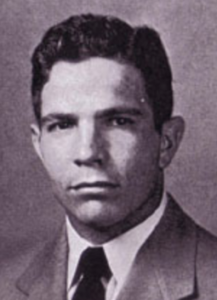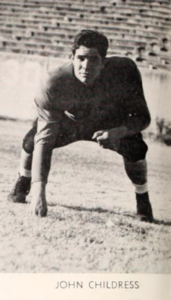Scroll of Honor – John Leumas Childress
All Around Leader
John Leumas Childress was one of those people who excelled  at everything he attempted. From the time he stepped onto the Clemson campus as a freshman member of the Class of 1951 from Augusta, Georgia, Childress was recognized as a leader.
at everything he attempted. From the time he stepped onto the Clemson campus as a freshman member of the Class of 1951 from Augusta, Georgia, Childress was recognized as a leader.
He was promoted quickly in the Corps of Cadets, serving as a sergeant his sophomore year and as first sergeant during his junior year. Childress returned to campus following ROTC training at Fort Meade, Maryland and was appointed a cadet lieutenant colonel and commander of 2nd Battalion. His military aptitude was acknowledged by his selection to Scabbard and Blade, the military honor society. But John Childress’s accomplishments were not limited to the military aspects of cadet life.
Childress was chairman of the Senior Council which handled student non-military disciplinary matters and made recommendations to Dr. Poole, the college president. He was a member of Blue Key, the Aiken-Augusta-Edgefield Club, and served as president of both the Block C Club and his Senior Class. And, among these activities and his textile manufacturing academic work, Childress also played on a pretty fair Tiger football team.
Coach Frank Howard’s 1950 Tigers could be forgiven if they weren’t keeping up with the United Nations’ response to the invasion of South Korea. That late summer and fall Childress and his teammates were focused on another outstanding season. Just two years earlier, the Tigers had recorded an undefeated gridiron campaign, completing their season with a Gator Bowl victory. The 1950 Tigers also had high hopes for the season.
Childress, weighing 192 pounds, played end on a team that featured a high  powered offense led by Tiger greats Fred Cone, Jackie Calvert, Ray Mathews and Billy Hair. Clemson started the season with a 55-0 whipping of Presbyterian College, then shut out Missouri 34-0 and North Carolina State 27-0. The next game was the annual Big Thursday match-up at the State Fair in Columbia. After falling behind early, the Tigers rallied to salvage a 14-all tie with the Gamecocks. That blemish fired the team which reeled off consecutive victories over Wake Forest, Duquesne, Boston College, and Furman before completing the season with a 41-0 drubbing of Auburn. Over the course of the season, the Tigers had outscored their opponents 329-62. The Tigers’ impressive record earned them a trip to the Orange Bowl, where they defeated hometown Miami 15-14.
powered offense led by Tiger greats Fred Cone, Jackie Calvert, Ray Mathews and Billy Hair. Clemson started the season with a 55-0 whipping of Presbyterian College, then shut out Missouri 34-0 and North Carolina State 27-0. The next game was the annual Big Thursday match-up at the State Fair in Columbia. After falling behind early, the Tigers rallied to salvage a 14-all tie with the Gamecocks. That blemish fired the team which reeled off consecutive victories over Wake Forest, Duquesne, Boston College, and Furman before completing the season with a 41-0 drubbing of Auburn. Over the course of the season, the Tigers had outscored their opponents 329-62. The Tigers’ impressive record earned them a trip to the Orange Bowl, where they defeated hometown Miami 15-14.
Upon graduation, John Childress was commissioned a second lieutenant in the Army and sent to Fort Knox, Kentucky for training. Before shipping overseas, Childress participated in additional tank training at Camp Irwin, the Army’s sprawling maneuver range in California. Childress was assigned to the 179th Infantry Regiment of the 45th Infantry Division.
Originally a division of the Oklahoma National Guard, the 45th had been ordered to federal service in 1951. It deployed to Korea in December of that year. The division was committed to the line against experienced Chinese forces and in bitter winter weather. By spring, the division was on the offensive, participating in Operation Counter with the objective of establishing patrol bases around the Old Baldy Hill area in west-central Korea.
On June 26, 1952, as the war began its third year, Second Lieutenant Childress was leading his platoon of the regiment’s heavy tank company near Tumyon-dong. The tankers were supporting infantrymen who were assaulting Hill 183. As Childress’s tanks moved up the hill, enemy mortar and artillery fire became so intense that the riflemen had to halt their advance and seek cover. Recognizing the perilous position of the infantrymen, Childress led his tanks through the enemy positions and to the crest of the hill, directing the advance and using his tank’s machine gun to fire on the enemy defenders. According to the posthumous Silver Star citation, “Lieutenant Childress was subsequently mortally wounded by sniped fire, but only after he had inflicted many casualties on the attackers, and his accurate fire had enabled his comrades to withstand the assault. The gallantry and courageous leadership displayed by Lieutenant Childress reflected the greatest credit on himself and are in keeping with the highest traditions of the United States Army.”
and courageous leadership displayed by Lieutenant Childress reflected the greatest credit on himself and are in keeping with the highest traditions of the United States Army.”
In addition to the Silver Star, John Childress was awarded the Purple Heart, the Korean Service Medal, the United Nations Service Medal, the National Defense Service Medal, the Korean Presidential Unit Citation and the Republic of Korea War Service Medal. He was survived by his wife, Frances and was interred at the Westover Cemetery in Richmond County, Georgia.
For more information on John Leumas Childress see:
https://soh.alumni.clemson.edu/scroll/john-leumas-childress/
For additional information about Clemson University’s Scroll of Honor visit:
